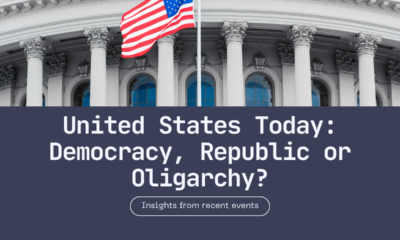Let's Talk
Patriot responds to Step One: History

Dear Roseanne,
I am a Marine, one who entered the Corps as it was being wound down from Vietnam, and was full of those who hated the Corps, but knew there was no civilian job that would pay them to sit on their derrieres, and give them power, with only a small coterie of “true believers” who stayed on because they would not allow “Their Corps” be ruined by “know-nothings”.
I believe that was a small picture of what the whole of our Nation has fallen to, and largely for the same reason. I look at the Corps, knowing how well we have always accomplished our mission, but knowing equally well, almost all of our actions were taken in direct opposition to the principles of “a free and independent Nation”, and in keeping with “a budding empire”, and at no time in my own lifetime did we fight to secure America, but exclusively, in every case, we have reacted for the security of our oil contracts, at the behest of “corporate America”, and this has been true since the civil war.
History of American independence: did you know?
 At the time of our choosing, we gave England good cause to fear our increasing actions and demands for our rights, we began our “insurgency” long before most of us remember, and many were never taught the facts. So many would believe we petitioned, wrote letters and asked for our rights, and then lost our tempers in 1775 and got serious. Few citizens acknowledge, even when they know, we began to fight the imposition upon individuals before records, and were seriously angry by the 1750’s, commonly attacking symbols of our “colonial status” and its subordination under that of “Englishman”.
At the time of our choosing, we gave England good cause to fear our increasing actions and demands for our rights, we began our “insurgency” long before most of us remember, and many were never taught the facts. So many would believe we petitioned, wrote letters and asked for our rights, and then lost our tempers in 1775 and got serious. Few citizens acknowledge, even when they know, we began to fight the imposition upon individuals before records, and were seriously angry by the 1750’s, commonly attacking symbols of our “colonial status” and its subordination under that of “Englishman”.
We were not only willing to rise against imposition when it was deliberately put against us for purpose, but we understood ourselves to be a far different people from those who lived in the long ago completely subdued “Europe”, and were a people willing and able to go into wilderness and fight bears, bringing home meat, we took families into the same wilderness, carved out a field, planted, and hunted, gathering, and subsisting on our own to such a degree, our ancestors forgot they were abjectly helpless when they arrived, and were “the Frontiersmen and families” they were, only because they fought and survived, while this was true of only some.
Most Americans live in the “knowledge” we wrote a constitution with our congress and government and stuff, when we won the war, and went forward, without ever considering the actual machinations of what did in fact take place. This misguided notion has been supported without being taught to keep the truth from rearing its “ugly head”. Because of this, most Americans are questioning the capacity of rising in rebellion, having no idea just how wild that idea was when we could not live as we were any longer.
Articles of Confederation
The fact we actually established no government at the conclusion of our war for independence speaks volumes in a language few can understand. Few “Peoples” have ever lived even a short time absent any formal central government, and that we did, and it failed, and we calmly chose to go into conference speaks volumes for the temper and control of those Ancestors, and their faith.
Telling the story of “The Articles of Confederation” changes most people’s understanding of our first years, and explain things which never made sense to them. Knowing we had gathered a loose establishment of rules of interaction and failed to make our way with them changes the whole impetus of “the constitutional convention”.
We sent representatives to gather in Philadelphia to reconsider “the Articles of Confederation”, and this is significant. Those men were selected to represent for the purpose of forming a more permanent and effective connection between the several states, while our children are taught by implication and anticipated inference, “our congress” wrote the constitution, with a deliberate implication it was already established, and by this justifying any constitutional issues belonging to their judgment.
The fact we selected representatives for an exacting purpose is far different than sitting legislators, writing an altered set of laws, yet the truth destroys the power presumed to belong to those elected now, and few if any ever “feel” the consent which alone makes authority exist.
Affirmative assent
What set our designing of government apart from every other, is our founders were strongly influenced by the success of the Indians, and the means of their having achieved it, forcing the last warring tribes to accede to peace by the assumption of it by the four other tribal groups, and suggesting there simply was no alternative. Out of this, which occurred long before we arrived, came the notion of “affirmative assent” as the most egalitarian way, with dissent being engaged rationally until it no longer has a logical rebuttal and the consensus must be accepted or war declared against all.
Our founders were most strongly influenced by John Mill and “On Liberty”, along with so many other strongly advocating natural law and “self-evident truth” as the sole reasonable founding stones for egalitarian society, and truly believed in the natural equality of Man, yet had come from European history, one where the choice of rule was decided by war. The notion no “law” was worthy of establishment unless it was able to be found acceptable by assent by everyone, and the debate in the tribal circle continued until all agreed, whether it be the law or rule, new plan, what ever, was good, reasonably applicable and fair, or had been concluded it simply wasn’t going to meet everyone’s acceptance, in which case either “The arm” was applied, if some tribe or leader was unreasonable in holding out, or the issue was re-stated again, and over until the stumbling blocks no longer were problems, and the whole of it was acceptable as it was, to all.
Our founders found this concept to be engaging as it dealt with an issue no previous form or means had ever been established by European means, and this was a major advance in establishing “egalitarian form”, as it provided a corner-stone which had been absent; the means of the smallest minority to get its problem upheld and fully considered and able to refuse to have it brushed away, but at the same time, a means of peer pressure established that unreasonable holding out could be overcome by moral pressure, noting this would be remembered at the next issue confronted.
Our constitution is vexing to all who don’t see themselves as “plank owners” of the Nation, and by this, their own “rule of law” they have over our collective government. This aspect on “affirmative assent” meant the whole of the constitution was argued over until no one had any issue with any aspect which they were willing to hang the whole of the operation up on. This was a new form of compromise for the purposes of government, and a major move away from European standards. I believe it is a large part which set our Nation apart.
The real history of the Dark Ages
I write this because your subject struck a nerve and a note, and it is only when one can by no means see one’s self as “part owner”, the real meaning of “sovereign” as a citizen, that one can live as a “victor” automatically, and on a daily basis. When we are subject to government, when we become subjects and not citizens, victim becomes the nature of our lives and our relationship with government. We were taught in school, no particular reason for the “dark ages”, but simply suggested it came about because our ancestors a thousand years ago, forgot technology, and it “got lost”.
Every bit of history today suggests the single reason for the “dark ages” was simply greed and totalitarian rule. As tribal rule gave way to ever increasing interconnections and governments formed, rulers each naturally tended toward ever more expanse of government and thus control, considering this the means of increasing their wealth and income. Few ever considered natural law, in particular, “the law of diminishing returns”, and for this reason, exploited their nations until there was no way one could live and farm openly, but had to hide all work and produce from the agents of the tyrant.
In such a world, all innovation is only useful for personal, nothing can be shared, except with equally starved neighbors, and then only if you know they can be trusted. Freedom, and the ownership of at least sufficient portion of one’s reapings to both eat, and have left-over for trade is the only way new ideas can ever come out in the open. The “dark ages” are exactly tied to the unfettered theft of all production by those who could produce nothing.
A repeat of the Dark Ages?
We have arrived at a cultural place, very similar to that one, where we have lived with others’ technology supplying our desires so long, we’ve turned all such work over to others, and in doing so, we’ve lost all the capital investment in two centuries of iron industry, over a century of steel built upon the previous, our entire technological industrial base is being turned over to the third world to lower costs more, and by this, we become a people who can only work at “serving each other”, and out of this there is no “capital gain”, but only the ongoing consumption of such capital as still is produced here, the majority now having reverted back to agriculture products, or getting there.
As a life-long metallurgist, I know that abandoning our industrial base allowed nature to catch up and what was invested has been allowed to decay and fall. We haven’t had real money since ’33, and all capital investment since that time comes with an interest price, as well as a capital price, and by this, it falls far short of real capital for long term purposes. We launched Saturn Five rockets and carried men to the moon on the foundation of an iron industry which was completely illegal when our forefathers started it, iron had to be imported, we couldn’t smelt it ourselves, but sheer demand meant we built our industry in spite of the charges. Every bit of capital that went in was gold, the only interest which was involved was dividend to those who invested their own money, and “the law of compound interest” meant that investment was more valuable when the steel industry began on top of it, than it was at the height of pouring iron for profit.
Watching the announced “last flight of the shuttle” was especially poignant to me, because it marked the end of our steel industry, something most people didn’t even know was in question or possible. Only those who work and live in the metal world fully understand, two centuries of capital investment was allowed to be buried, when we chose Japanese steel over our own, and then found Chinese steel over Japanese, because we had lost our standards far enough the dramatically lower quality Chinese steel didn’t even phase us the way the slightly poorer quality Japanese steel did when we began to receive it in the 70’s.
For most Americans, the last shuttle flight had little real meaning, it only closed a chapter in their life. One has to be deeply invested in Our Nation and the intent of providing it for posterity to realize any people can have all they desire for themselves, all they must do is be willing to pay the ultimate price, however it takes some very special planning, some very special principles to establish a free and independent way of life, and establish a means of passing it down.
We put that means to work in putting “the rule of law over government”, and defined legitimate government in terms of natural law. We have allowed ourselves to fall away from that as a society, and as a consequence, those elected have realized they could assume powers while we ignored their actions, and when all is said and done, we’ve utterly failed to maintain our thumb on government, and for that reason, it has pursued its nature and natural course and now rules over us.
When our “insurrections” were sufficient to cause the empire to send out two “ships of the line” full of troops to “quarter” among the colonists, we could either fall on our knees and beg, or stand as we had, and face the music.
We, America, have forgotten our own history, and become “the Tories” of the time of revolution. We can realize this, and choose to “gird our loins” , and face what we have allowed to gather in force, knowing it has been allowed to become what we face, and taking heart knowing it couldn’t without our allowing, or we can be victims and allow the free world to come to an end.
I would have it any other way, but having allowed our central government to go this far, we can only take to war, or accept our fate.
Semper Fidelis,
John McClain
April 11, 3014 ~TPATH~
Dwight Kehoe replies
All of our dealings with this super patriot, Marine McClain, have been educational and enlightening. His knowledge and understanding of where we as a nation have come from, as well as where we are inevitably headed, has no academic or insightful equal.
Having said that, it is understandable that anyone could turn cynical on certain aspects relating to the history of American wars and the purposes thereof. While TPATH may agree that America’s wars were about oil, they were about the free flow of it, not confiscation. It must be understood that oil is energy, energy is life. And while it also may be true that many have profited from war, without those profiteers, no war could have been won. While they profited, America’s liberty prospered.
TPATH
Reprinted from TPATH
[subscribe2]
-

 Executive4 days ago
Executive4 days agoSecret Service chief gets no solace
-

 Executive3 days ago
Executive3 days agoWaste of the Day: Louisville Taxpayers Pay Nearly $600,000 For Empty Building’s Maintenance, Security
-

 Guest Columns4 days ago
Guest Columns4 days agoFear Itself: Democrats’ Favorite Strategy Caused Their Current Chaos
-

 Executive3 days ago
Executive3 days agoWhere is Joe Biden – or Jill?
-

 Executive1 day ago
Executive1 day agoWaste of the Day: Throwback Thursday: Cities Used Crime Prevention Funds on Soccer Games, Paper Shredding
-

 Executive2 days ago
Executive2 days agoFacile and politically motivated suggestions
-

 Civilization4 days ago
Civilization4 days agoBuild Iron Dome in the United States To Prepare for Israel’s Worst Day
-

 Executive4 days ago
Executive4 days agoThe Emerging GOP Plan To Beat Kamala Harris










[…] Patriot responds to Step One: History […]
Cindy Blum liked this on Facebook.
“The fact we actually established no government at the conclusion of our war for independence speaks volumes in a language few can understand.”
Few could understand this claim because it makes no sense. The author seems to both be aware of and ignoring the Article of Incorporation.
We all know the United States of America was formed by declaration on July 4, 1776. While the government was weak, as intended, it indeed existed. Between 1776 and 1789, when the Constitution was drafted and ostensibly became the governing document even prior to complete ratification by the then states, the Confederation had various areas of authority that the colonies expressly gave up as a consequence of joining in the union, including some that are still familiar, including levying taxes, conducting foreign diplomacy, raising an army and navy, etc.
“… with a deliberate implication it was already established, and by this justifying any constitutional issues belonging to their judgment.” Because it did. The Confederacy existed in the various sovereign colonies. They retained the power to reform it as they wished. And they did by strong consensus. Is the author questioning the legitimacy of the Constitution?
“The fact we selected representatives for an exacting purpose is far different than sitting legislators. …” What does this actually mean? “We”, in the sense that I take the author to be referring to the people of the United States vs. the colonies, did not select anyone for any exacting purpose. The colonies chose their own representatives, as they were entitled to under the Articles of Confederation. There was no functional difference between the appointment of representatives to the Continental Congress or the Constitutional Convention and what occurs today: the governing documents left to the states the right to select their own representatives.
“… writing an altered set of laws. …” I guess, although this is largely meaningless, as they had the power to do so. It’s even repeatedly said on this site that sovereigns retain whatever great degree of power the authors claim — certainly that at least includes political self-determination.
“… yet the truth destroys the power presumed to belong to those elected now. …” What does this mean? Again, is the author questioning the legitimacy of our Constitution? Why isn’t the right of states to elect their own representatives to Congress lauded as an explicit recognition of their sovereignty as members of a confederacy? You may question what that means or whether it’s true, but it seems to be the position you’d wish to take supporting states rights as you do.
“… and few if any ever “feel” the consent which alone makes authority exist.” I don’t understand what this means, and I’m not trying to be obtuse. There is no “feeling” of consent among citizens unless you contend they have some sort of visceral experience of their forebears having executed governing documents indicating such “consent”. In any event, “consent” is a thorny topic that brings us all the way back to enlightenment political philosophy. It’s fair to question whether one who personally does not wish to consent has any right to do anything about it, but I would be astonished to hear that the author is suggesting that.
I could write a lot more about this essay, but I think I’ve sufficiently shown that the author isn’t quite getting it right. I’d urge anyone reading this to do some simple research and read the governing documents themselves. Those alone answer a number of inaccurate claims here. A basic examination of the history of the period answers the rest.
Apologies for typos and weird auto-co-wrecktions — I’m on a mobile device that makes bad assumptions about what I mean when I mash the wrong buttons.